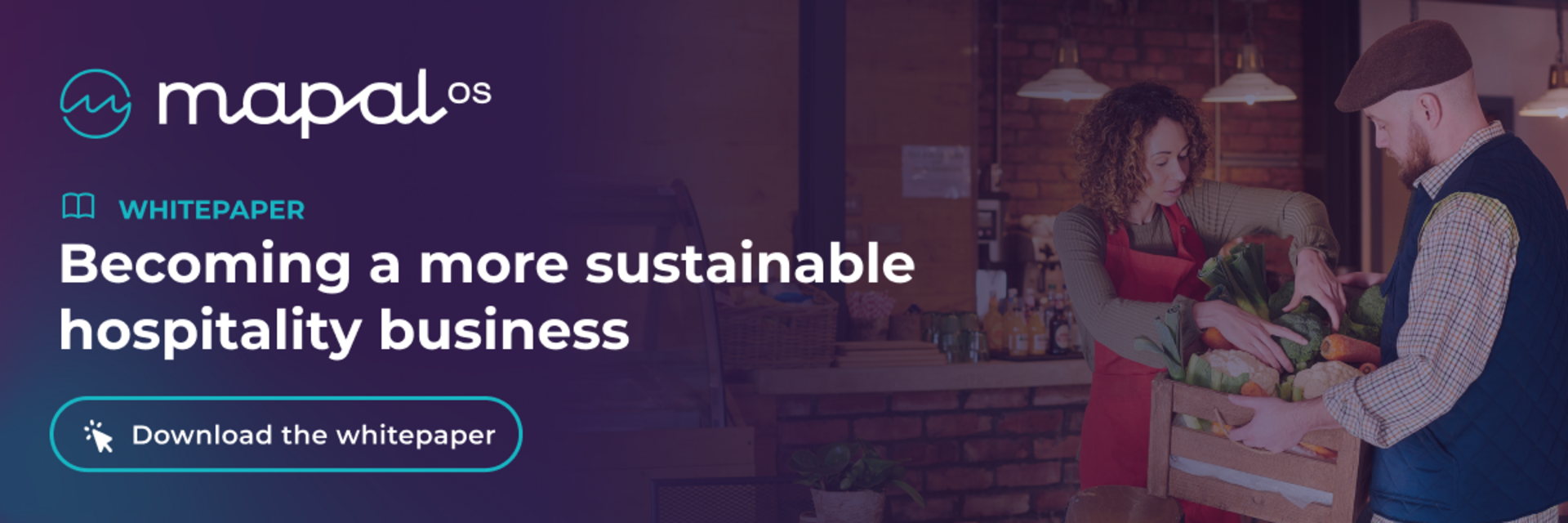Sustainability: reducing food waste in hotels and restaurants
Sustainable development has become a major global challenge in recent years and has gradually transformed many spheres, both economic and social.
This, and the area of food waste in hotels and restaurants, is just one of the themes we’ve covered in our recently published Expert guide to hospitality compliance for multi-site businesses.
What’s more, our customers are becoming more aware of these issues and are choosing companies that demonstrate their commitment to sustainability. In Accenture’s 2021 report, Declutter marketing for the reimagined consumer, 50% of the 22,000 global customers surveyed said they’d reimagined their values and now base their purchasing decisions on factors beyond price and quality. Of these “reimagined” consumers:
66% said they now expect brands to take more responsibility for motivating them to live by their sustainable values.
65% are attracted to brands that that source services and materials in highly ethical ways.
65% of reimagined customers are attracted to doing business with brands that environmentally friendly.
Many organisations are already driving change in the hotel and restaurant sector, including the Sustainable Restaurant Association (SRA), who assists restaurant businesses in their efforts to improve sustainability, both in the UK and internationally. The SRA also offered some great advice in our recent whitepaper, Becoming a more sustainable hospitality business.
Which UK regulations cover food waste in the hospitality industry?
The UK government has been somewhat slower to enforce sustainable compliance measures to reduce food waste in commercial business.
Up until now, food waste regulations have been targeted more towards domestic waste. Businesses in the UK are currently only required to ensure that food waste in restaurants and hotels is hygienically disposed of, ensuring no cross-contamination during food preparation and no stipulation that it should be recycled.
The government also levies and environmental tax on businesses to encourage them to be more eco-responsible. Exemptions to certain types and size of business, however, mean that these regulations are far from universal.
However, this will shortly change, and stricter legislation may be introduced in 2023. This is likely to include mandatory separate food waste collection with a targeted recycling rate of 75% by 2030. It’s now a case of when, and not if.
Sustainable compliance in Scotland: positive results
In 2016, the Scottish government introduced similar legislation. It was part of its plans to promote a circular economy for food waste which treats waste as a resource that can be reused or recycled endlessly.
Since 2016, all Scottish businesses that produce over 5kg of food waste have a legal obligation to ensure all food waste and spoiled items are collected for separate recycling by a registered waste carrier service.
The feedback has been positive, and evidence shows that food service companies have changed their buying habits to order only what they need in order to reduce their food waste. It also cut down on general waste being sent to landfill as a result.
Zero Waste Scotland revealed in 2016 that the amount of food treated at Scottish anaerobic digestion plants increased by as much as 15,000 tonnes in the first few months after the legislation was introduced and it’s been rising ever since.
How to prepare for new UK food waste and sustainability compliance legislation
A full analysis
The first stage of any food waste reduction initiative is to do a full analysis to identify where and how much food is being wasted in your organisation. To do this, it-s essential to weight the amount of waste produced in your business and there are three steps
The first stage is diagnosis, essential to be able to identify the causes and quantities of daily waste in your business.
This involves a weighing process with three steps:
- Measure your prepared quantities
Firstly, weigh each dish once prepared, before serving it to your customers.
- Weigh the returned plates
Weigh your dishes a second time at the end of the service and identify the volume of excess production.
- Creating an appropriate action plan
Prioritise your actions to focus on the most important losses, then highlight one or two actions that can feasibly produce visible results to motivate your team. Finally, set specific objectives and indicators to help you gauge the effectiveness of your action plan.
Controlling purchases and stocks
Streamline your orders to avoid excess stocks and the temptation of serving oversized portions. Planning your menu well in advance also enables you to forecast stocks more accurately. Order seasonal fruit and vegetables where possible. And when you receive your products, make quality a priority and ensure they are consumed at the best time. Organise your storage area according to the type and duration of conservation.
All this normally involves time and effort, of course, but you can achieve this so much more quickly and efficiently with a digital food kitchen inventory management system like Easilys f&b. What's more, you can roll out the solution to kitchens across all your sites to ensure that ingredients, menus, prices, portions and food waste are optimised in same way.
A tailor-made service
Draw up accurate recipe cards to establish ideal portion sizes and ensure they are used across all sites. Try presenting your dishes on smaller plates and salad bowls and plan your dishes in line with your customers’ preferences.
And don’t be shy: ask your customers directly how much food they would ideally like on their plate - their opinion counts! You could also think about adjusting the service according to the number of customers forecasted for that day.
Recovering your surplus food
Sorting your waste is a fundamental part of reducing it.
The best way to recycle your waste is, of course, to sort it! Sort waste on a daily basis, and at every stage of your kitchen processes. Why not get creative with your dishes and reuse your bio-waste (end, peelings chips, etc.). You could also think about donating your unsold food to food banks and associations.
Well-maintained equipment
Keep your equipment in good working order: regular maintenance will help you avoid technical failures (e.g., breaking the cold chain). In doing so, you’ll also be avoiding unnecessary food loss and even worse, a customer becoming ill as a result.
Ensuring that your cooling and heating equipment is working correctly is vital not only to guarantee food safety, but also to save energy and guarantee the comfort of your guests. Add that to the list of other hundreds of daily checks your team must perform and you’re dealing a labour-intensive process. You could move all your daily procedures into a simple, mobile-friendly digital checklist format with Compliance by Mapal, and your team save time while your company saves money. Not only that, you’ll also get an overview of compliance levels across all sites in your organisation in real-time.
Committed employees
Get your employees involved and remind them about the importance of reducing food waste. Raise awareness among the team by offering short and engaging hospitality training modules. By communicating regularly about your action plan and bringing your team together to discuss and reflect on it as a group, you’ll be fostering teamwork and collective action.
Tackle food waste with Easilys f&b
Easilys f&b is a food inventory management tool committed to sustainability and connected object technology (connecting equipment to apps and smart devices) to restaurant owners and catering organisations through its waste measurement and analysis module.
Our tool provides sorting tables and connects waste bins in order to analyse and measure daily food waste simply and efficiently: overall weight of waste or per dish, identifying this weight according to the stage of production and service, etc.
This story about how Pokawa uses Easilys f&b to centralise food planning, optimise production and purchasing while also ensuring brand standards remained high during its rapid growth.
Do you want customers to recognise you as an eco-responsible business? Discover how Mapal-OS can help you reduce your daily food waste and monitor the traceability of your purchases. Get in touch for more information or a free demo.





